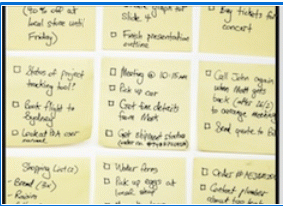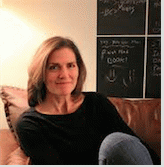My guest today is Brigid Schulte, Pulitzer Prize-winning journalist and author of the New York Times bestseller, Overwhelmed: How to Work, Love and Play When No One Has the Time [Farrar, Straus and Giroux, 2014; Picador (paperback edition), 2015].
JB: Welcome back to OpEdNews, Brigid. Since we last spoke in July, you've made some major changes in your life. What can you tell us about that?
BS: Hi, Joan! Great to talk with you again. Since we last spoke, I made a pretty major life decision. After 17 years at the Washington Post, I decided to move to New America, a nonpartisan think tank, to become the director of the work-life and gender equality program that we've just renamed The Better Life Lab.
I'm still very much a writer and journalist and working on the next book project is central to my mission at New America. But this gives me an opportunity to deepen my reporting and writing and expand the work I do on time pressure and modern life - why we feel that way and what, individually and structurally, we can do to change it, to work toward creating the conditions for a Good Life for all.
It was a tough decision. I've worked for daily newspapers since I got out of graduate school in 1987! And I'd been at the Post for nearly 17 years. I started when my son was six months old, and I left when he topped 6'3". I came to the Post largely because of my son. I'd been a national reporter and traveled quite a bit in my previous job. And though I wanted to continue working, with a new baby, I wanted to be home for dinner and story time every night, and to work flexibly from home when I could. The Post gave me that opportunity, and I'm incredibly grateful. Through the years, my daughter even set up her own little "office" right next to mine in the Alexandria bureau where I worked at the time.
But it was also an exciting opportunity at an exciting time. In just a few short years, so-called "work-life" issues have begun to move out of what I call the "ladyspace" and into the mainstream, where, frankly, they've always belonged. That's due, in large measure to high profile women writing really honest and smart books about it - Sheryl Sandberg, Anne-Marie Slaughter - and I hope I've contributed to that national conversation as well with my book. At New America, I have the opportunity to work with Anne-Marie everyday - she's the CEO and President of New America - which is thrilling and inspiring. And I get to be part of the movement setting the agenda.
This is our vision At the Better Life Lab: Real choices. Real Parity. All People. Early pioneers in the work-life field said we'd know we'd been successful when both men and women could make real choices about how they work and live, without penalty. Because there are penalties now for deviating from traditional gender roles. Our mission is to redesign how we work, reframe gender to include both the advancement of women and the evolution in the role of men, and to rewire policy and transform culture to truly support 21st century families.
JB: I can tell how excited you are about this major life change, Brigid. Sounds great and very much you. Let's talk more about the Better Life Lab and what it's trying to accomplish. I guess the $64,000 question is how we get from Here to There.
BS: That is the right question, isn't it! In my book, I also explored how we change. When it comes to time and how we live, there's no question that we need to think on two levels: the personal and the structural. There are indeed personal mastery tools we can learn, work we can do to shift mindsets and adopt better habits. These are worthy and often lifelong endeavors. But that's simply not enough.
You can have every intention in the world to do a good days' work, and leave with enough time to get home and spend time with your family, but if you have a boss or co-workers who give you stink eye as you get up to leave in the evening, it will take so much psychic energy to keep to your schedule that you may give in and conform - it's easier, often, to go with the flow of the crowd. And right now, the crowd in America is all about valuing long work hours, bragging about not taking vacation. Yet we're not having a discussion about how "good" those long hours really are. I have to be honest, I'm a recovering workaholic, and I can often fall into the trap of long hours myself. Then I get overtired. And when I'm overly tired, you know what I do? I do the easy, mindless stuff - I answer emails, I tackle easy things to "get off my plate" so I can get to the big stuff - but I don't have the energy to get to the big stuff. Truthfully, that's what a habit of long work hours is doing to all of us.

actual post its at work, organizing Brigid and fam
(Image by courtesy of Brigid Schulte) Details DMCA
JB: I hear you!
BS: So we need to change the structures around us: why do we have a law governing work hours that hasn't changed since 1938? Why can we work salaried workers to death by law? Why is part-time work so crummy in the United States? Why do we have no paid parental leave policy? Why are women going back to work still bleeding after giving birth? Why do we discourage fathers from taking parental leave? Why is good, affordable and accessible child care almost impossible to find? Where is the market solution that both enables families to work and sets up our future generation for success during the critical 0-5 years when their brains are developing? Why are flexible work arrangements something most often made ad hoc between a worker and a manager, which can evaporate at the whim of the next manager? Why are women paid less for equal work? Why do women take a financial hit and men get a bonus when they become parents? Why can't low-wage workers have more control over their schedules, and thus less chaos in their lives and the lives of their families? Why don't we value caregiving in this country - both paid and unpaid - when that's not only what makes the economy run, but is the source of human happiness - our love and connection with others. These are all structural, policy questions.
When I was feeling overwhelmed at the start of writing my book, I thought I was alone. I thought I was just one big failure and that everyone else had this work-life thing figured out. Instead, I discovered that we are not in the midst of an epidemic of personal failures. The policies, practices, structures and cultural expectations that still hold sway in our country are at odds with the way the majority of us live.
So - how to change? Talk. Write. Tell stories. Research. Get people in a room who don't think these issues are important or don't pertain to them and show them how they do. Get people together who don't typically talk and help them find common ground. Find bright spots - show how change is possible, and why it's mattered. The old way - pushing on the federal government to adopt new laws - simply haven't worked. We haven't had significant structural change in this arena in a generation - since the 1993 Family Medical Leave Act - 12 weeks of gender-neutral unpaid leave that still doesn't cover 40 percent of the workforce. It's time for a new way. That's what we're looking to do.
(Note: You can view every article as one long page if you sign up as an Advocate Member, or higher).






